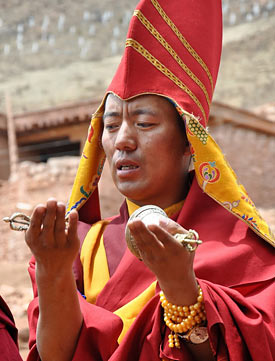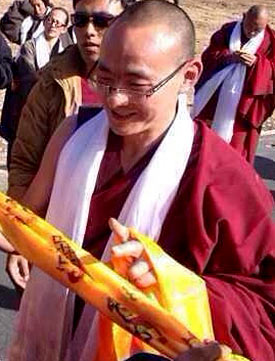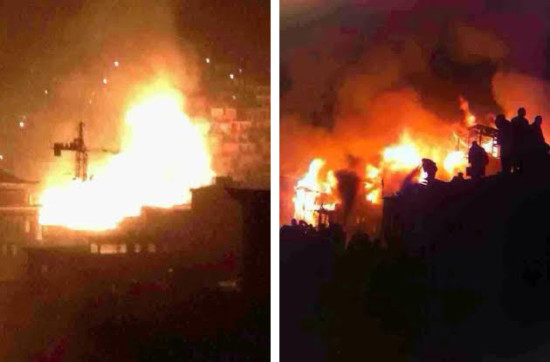Tibetans targeted for political “crimes”

Khenpo Karma Tsewang (known as Khenpo Kartse).

Kunga Tseyang after being released from prison.
Reports have emerged that a prominent Tibetan lama, who has been held in detention on political grounds since December 6, is in critical health due to a serious liver condition, and has been denied access to the doctor who had been treating him. Khenpo Karma Tsewang (known as Khenpo Kartse) is the highly regarded abbot of Gongya monastery in the Tibetan region of Kham. He is well known for his educational and community service initiatives.
Hundreds of Tibetans attended a vigil on January 15, pictures of which were obtained by ICT, peacefully calling for Khenpo Kartse’s release. The vigil was held outside the same prison in Khenpo Kartse’s home area of Nangchen where 16 monks were detained in December, after they participated in a peaceful protest with hundreds of fellow monks calling for Khenpo Karste’s release.
As the events surrounding Khenpo Kartse unfold, the Tibetan Center for Human Rights and Democracy has been able to report that Kunga Tseyang, a monk well-known for his writing and environmental activism, was released from prison on January 12, after serving five years for his political essays. Kunga Tseyang, who uses the pen name Gangnyi (Sun of Snowland), was one of the many Tibetan writers and intellectuals who were targeted by authorities for their chronicling and commentary on the Tibetan protests of 2008, and the authorities’ violent response. A translation of Kunga Tseyang’s article, ‘Who are the real separatists?’ can be read online here.
Political charges brought by authorities continue to plague Tibetans. In another recent case, the fate of the husband of a Tibetan woman believed to have self-immolated remains unclear. Dolma Kyab, a Tibetan man in his early 30’s, was sentenced to death last August in a trial held in secret after officials accused him of killing his wife, Kunchok Wangmo, despite strong indications that she self-immolated. According to Radio Free Asia and other Tibetan sources, officials had initially attempted to bribe Dolma Kyab into claiming that his wife had committed suicide due to family problems, which he refused.
Recent fires in Tibet spark concern for overdevelopment

A fire broke out in the monastic encampment of Larung Gar (Serthar) in eastern Tibet January 9, 2014 during the evening. According to Tibetans in the area who posted the photos on social media, at least 100 homes of nuns living at the religious complex were burnt down.
Two devastating fires broke out in Tibet recently. A January 9 blaze threatened one of the world’s largest centers of Buddhist learning, the Serthar Buddhist Institute, located in eastern Tibet, home to thousands of monks and nuns. No casualties were reported from the fire, however the flames engulfed at least 100 homes used by nuns at the institute. While the exact cause remains unclear, faulty electrical wiring or a lit butter-lamp is suspected of starting the fire that claimed the primarily wooden structures.
The second recent fire ravaged the primarily wooden buildings in place in the old Tibetan town in Gyalthang on January 11. State media reported no casualties among the over 240 homes destroyed and more than 2,600 people evacuated from the area. While faulty electrical wiring has been cited as the immediate cause of the blaze, a local government official blamed over-development due to excessive tourism as contributing to the spread of the fire. In 2001, the drive to promote tourism in the area led authorities to rename the surrounding county, ‘Shangri-la,’ after the mythical land of James Hilton’s novel, Lost Horizon. The Gyalthang fire was the 11th major fire to strike Tibet this past year. See ICT’s January 27th report for more information.
Chinese New Year takes on martial theme in Tibetan area
As Chinese New Year gets underway, authorities in Draggo county, located in eastern Tibet, have conducted military parades and deployed heavily armored vehicles in the streets in a show of overwhelming force, according to Voice of America’s Tibetan service. The increased number of checkpoints and heighted security atmosphere comes approximately two years after police opened fire on peaceful demonstrators, killing three Tibetans, on the first day of Chinese (and Amdowa) New Year. The shooting in Draggo, along with similarly violent responses to protests in neighboring Tibetan areas in Sichuan province (see ICT reports here and here), prompted the U.S. Senate to pass a resolution on January 30, 2012, condemning the repression in Tibet. NPR also reported on the incidents.
Congress hears from next Ambassador to Beijing; approves Tibet funding

On the other side of Washington, DC’s Capitol Hill, the U.S. Congress has once again made a strong statement in support of the Tibet issue, setting aside nearly $19 million for Tibet-related programs for fiscal year 2014. ICT’s Director of Government Relations, Todd Stein, noted that, “[w]hile these programs are but a minuscule part of the overall foreign aid budget, this investment yields big dividends for Tibetans and their efforts to preserve their culture and identity.”

